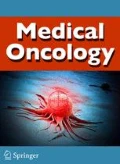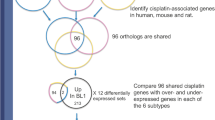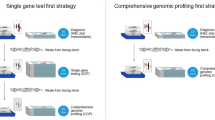Abstract
There is no consensus in the salvage treatment for non-small-cell lung cancer (NSCLC) with acquired resistance to primary epidermal growth factor receptor–tyrosine kinase inhibitors (EGFR-TKIs). Fifty-one consecutive EGFR-mutated NSCLC patients with TKI retreatment after acquired resistance were enrolled in this study. The quantitation of mutation abundance was performed by real-time fluorescent quantitative PCR. The correlation between mutation abundance and outcomes of readministrated TKI was analyzed by survival analysis. Patients with high (H) mutation abundance (24/51) had a significantly (log-rank, P < 0.05) longer (5.27–2.53 months) median progression-free survival (PFS), compared with the low (L) abundance group (27/51), whereas the median overall survival showed no difference (21.00–18.20 months, log-rank P = .403) between the two groups. Objective response and disease control rates in group H and group L regarding the second round TKI treatment were 8.3, 70.8 and 0, 48.1 %, respectively. Groupings with different mutation abundances were significantly associated with PFS under multivariate Cox proportional hazards regression model [hazard ratio (HR) for group H vs. L, 0.527; P = .036]. Mutation abundance affects the efficacy of EGFR-TKIs readministration in NSCLC with acquired resistance. The quantitative mutation abundance of EGFR may be a potential predictor for selecting optimal patients to readministrate EGFR-TKIs after acquired resistance to primary TKI.


Similar content being viewed by others
References
Zhou C, Wu YL, Chen G, et al. Erlotinib versus chemotherapy as first-line treatment for patients with advanced EGFR mutation-positive non-small-cell lung cancer (OPTIMAL, CTONG-0802): a multicentre, open-label, randomised, phase 3 study. Lancet Oncol. 2011;12:735–42.
Rosell R, Carcereny E, Gervais R, et al. Erlotinib versus standard chemotherapy as first-line treatment for European patients with advanced EGFR mutation-positive non-small-cell lung cancer (EURTAC): a multicentre, open-label, randomised phase 3 trial. Lancet Oncol. 2012;13:239–46.
Cataldo VD, Gibbons DL, Perez-Soler R, Quintas-Cardama A. Treatment of non-small-cell lung cancer with erlotinib or gefitinib. N Engl J Med. 2011;364:947–55.
Jackman D, Pao W, Riely GJ, et al. Clinical definition of acquired resistance to epidermal growth factor receptor tyrosine kinase inhibitors in non-small-cell lung cancer. J Clin Oncol. 2010;28:357–60.
Yano S, Wang W, Li Q, et al. Hepatocyte growth factor induces gefitinib resistance of lung adenocarcinoma with epidermal growth factor receptor-activating mutations. Cancer Res. 2008;68:9479–87.
Taniguchi K, Okami J, Kodama K, et al. Intratumor heterogeneity of epidermal growth factor receptor mutations in lung cancer and its correlation to the response to gefitinib. Cancer Sci. 2008;99:929–35.
Bai H, Wang Z, Wang Y, et al. Detection and clinical significance of intratumoral EGFR mutational heterogeneity in Chinese patients with advanced non-small cell lung cancer. PLoS One. 2013;8:e54170.
Oh IJ, Ban HJ, Kim KS, Kim YC. Retreatment of gefitinib in patients with non-small-cell lung cancer who previously controlled to gefitinib: a single-arm, open-label, phase II study. Lung Cancer. 2012;77:121–7.
Kaira K, Naito T, Takahashi T, et al. Pooled analysis of the reports of erlotinib after failure of gefitinib for non-small cell lung cancer. Lung Cancer. 2010;68:99–104.
Eisenhauer EA, Therasse P, Bogaerts J, et al. New response evaluation criteria in solid tumours: revised RECIST guideline (version 1.1). Eur J Cancer. 2009;45:228–47.
Zhang LJ, Cai L, Li Z, et al. Relationship between epidermal growth factor receptor gene mutation and copy number in Chinese patients with non-small cell lung cancer. Chin J Cancer. 2012;31:491–9.
Azuma K, Okamoto I, Kawahara A, et al. Association of the expression of mutant epidermal growth factor receptor protein as determined with mutation-specific antibodies in non-small cell lung cancer with progression-free survival after gefitinib treatment. J Thorac Oncol. 2012;7(1):122–7.
Ohashi K, Maruvka YE, Michor F, Pao W. Epidermal growth factor receptor tyrosine kinase inhibitor-resistant disease. J Clin Oncol. 2013;31:1070–80.
Watanabe S, Tanaka J, Ota T, et al. Clinical responses to EGFR-tyrosine kinase inhibitor retreatment in non-small cell lung cancer patients who benefited from prior effective gefitinib therapy: a retrospective analysis. BMC Cancer. 2011;11:1.
Koizumi T, Agatsuma T, Ikegami K, et al. Prospective study of gefitinib readministration after chemotherapy in patients with advanced non-small-cell lung cancer who previously responded to gefitinib. Clin Lung Cancer. 2012;13:458–63.
Asahina H, Oizumi S, Inoue A, et al. Phase II study of gefitinib readministration in patients with advanced non-small cell lung cancer and previous response to gefitinib. Oncology. 2010;79:423–9.
Gerlinger M, Rowan AJ, Horswell S, et al. Intratumor heterogeneity and branched evolution revealed by multiregion sequencing. N Engl J Med. 2012;366:883–92.
Zhou Q, Zhang XC, Chen ZH, et al. Relative abundance of EGFR mutations predicts benefit from gefitinib treatment for advanced non-small-cell lung cancer. J Clin Oncol. 2011;29:3316–21.
Ellison G, Donald E, McWalter G, et al. A comparison of ARMS and DNA sequencing for mutation analysis in clinical biopsy samples. J Exp Clin Cancer Res. 2010;29:132.
Hata A, Katakami N, Yoshioka H, et al. Erlotinib after gefitinib failure in relapsed non-small cell lung cancer: clinical benefit with optimal patient selection. Lung Cancer. 2011;74:268–73.
Maemondo M, Inoue A, Kobayashi K, et al. Gefitinib or chemotherapy for non-small-cell lung cancer with mutated EGFR. N Engl J Med. 2010;362:2380–8.
Hata A, Katakami N, Yoshioka H et al. Rebiopsy of non-small cell lung cancer patients with acquired resistance to epidermal growth factor receptor-tyrosine kinase inhibitor: Comparison between T790 M mutation-positive and mutation-negative populations. Cancer. doi:10.1002/cncr.28364.
Acknowledgments
This work was supported by National High Technology Research and Development Program of China (863 Program) (2012AA02A502).
Conflict of interest
The authors declare that there is no conflict of interest.
Author information
Authors and Affiliations
Corresponding author
Additional information
Ze-Rui Zhao, Jin-Feng Wang and Yong-Bin Lin have contributed equally to this work.
Electronic supplementary material
Below is the link to the electronic supplementary material.
12032_2013_810_MOESM1_ESM.tif
Supplementary Fig. 1. Patterns of response among individual patients Group H, high EGFR abundance group; Group L, low EGFR abundance group; TKI, tyrosine kinase inhibitor; chemo, chemotherapy; PFS, progression-free survival (TIFF 4887 kb)
Rights and permissions
About this article
Cite this article
Zhao, ZR., Wang, JF., Lin, YB. et al. Mutation abundance affects the efficacy of EGFR tyrosine kinase inhibitor readministration in non-small-cell lung cancer with acquired resistance. Med Oncol 31, 810 (2014). https://doi.org/10.1007/s12032-013-0810-6
Received:
Accepted:
Published:
DOI: https://doi.org/10.1007/s12032-013-0810-6




